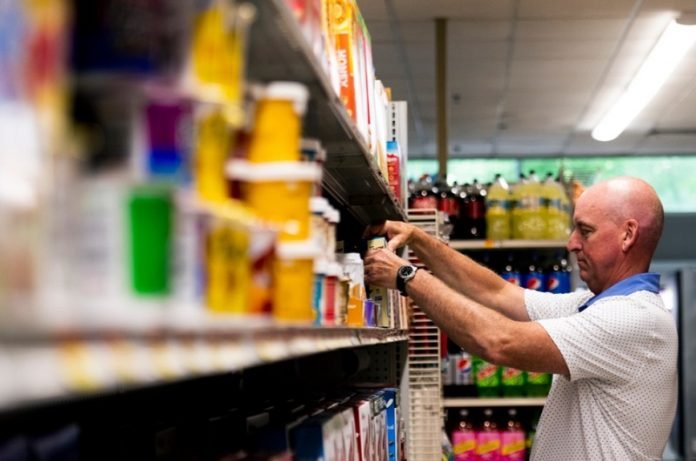
The price of food has been rising exponentially.
Tahteana DeRosa, a security officer for the past half-year at Northeastern, has adapted her selections at the grocery store as a result.
“I’ve had to get smaller portions, where I used to buy in bulk,” DeRosa said Thursday after buying a few items at Symphony Market on Huntington Avenue near the Boston campus. She has especially noticed the rising prices of meats and vegetables.
Overall, inflation in June climbed to 9.1% over one year ago as measured by the consumer price index—the fastest rise in more than 40 years.
The cost of groceries is up 12.2% over the past year, an increase that can be especially painful for people with low incomes.
“When food prices go up, it doesn’t affect us all equally,” says Rory Smead, associate professor of philosophy and the Ronald L. and Linda A. Rossetti Professor for the Humanities at Northeastern.
“For people that are in the middle class and reasonably comfortable, I may be annoyed that the grocery bill is higher, but it’s not like it’s radically changing my behavior. But for somebody that’s working in the margins, all of a sudden you have to start making hard decisions about what foods to buy.”
People of all incomes are increasingly wary of price hikes still to come.
The cost of groceries has surpassed the price of gasoline as the top inflation concern among Americans according to a poll released last month, with 90% of respondents troubled by rising food prices.
“I’ve been doing this for 35 years, and I’ve never seen anything like it,” says Brett Miller, the owner of Wollaston’s Market on Huntington Avenue, which he took over from his father a decade ago.
Wollaston’s has been able to hold prices steady on its famous sandwiches, despite the rising costs of bread and deli meats.
But everything else at the store seems to be rising, based on the costs passed on by suppliers.
“When the parents come in during orientation, I think they notice that a little bit more than the students do,” says Bob Peredna, who has been managing Wollaston’s for 26 years.
“I was talking with a gentleman yesterday, he’s painting on campus with one of the [university] contractors, and he was making a comment about steak tips that cost $38. He said, ‘I wanted steak tips, but I couldn’t pay $38.’”
The economy overall “remains quite strong,” says Robert Triest, a former vice president and economist at the Federal Reserve Bank of Boston who now serves as chair and professor of economics at Northeastern.
The unemployment rate has held steady at 3.6%, which is near a half-century low, and the creation of 372,000 jobs in June exceeded expectations.
But Triest anticipates that the economy will soften later this year as a result of the Fed’s plan to continue raising interest rates in hope of arresting inflation.
Though U.S. gas prices have dropped daily for the past month, energy costs remain high. Rents are going up at their fastest rate since 1986, and wages are not keeping up.
The high costs of essentials may help explain why TVs and other goods are moderating in value.
“People are spending more on gasoline and food, and that leaves them less to spend on other things,” Triest says. “So that does have an effect of reducing expenditures in some consumer categories.”
But the issue of food prices will be more difficult to resolve. The variety of factors includes the war in Ukraine, where Russia is using grain as a weapon, according to Stephen Flynn, founding director of Northeastern’s Global Resilience Institute, who worries about devastating consequences worldwide.
“Russia and Ukraine produce about one-third of the world’s grains that is core to the diet of the poorest nations,” Flynn says.
“Without bread, or if populations face paying a very high cost for bread, you have civil unrest. The stakes for the Middle East and Africa are incredibly high.
“The Black Sea has always been the conduit for those supplies but it has been bottled up since the start of the war,” Flynn adds.
“This makes figuring out how to open the Black Sea to grain shipments the No. 1 security issue of our already very messy times.”
At Wollaston’s, Miller worries that the rising costs of food are creating a new normal.
“A lot of times things don’t go back down,” Miller says of food prices. “You get to a certain point where people get used to paying it, and that’s what it becomes.”
Written by Ian Thomsen.



